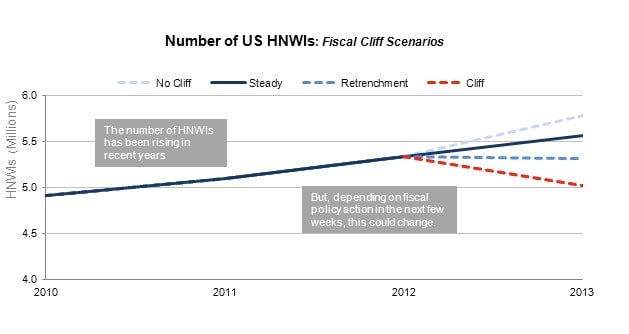If the US falls off the fiscal cliff, 315,000 millionaires go with it
From baseball players requesting their bonuses before Dec. 31 to millionaires lobbying for higher taxes on themselves, America’s wealthy are weighing in on the debate over the US “fiscal cliff.” Barring a deal between the White House and Republicans, automatic spending cuts and tax increases would go in effect next year and could, economists say, push the US into another recession.

From baseball players requesting their bonuses before Dec. 31 to millionaires lobbying for higher taxes on themselves, America’s wealthy are weighing in on the debate over the US “fiscal cliff.” Barring a deal between the White House and Republicans, automatic spending cuts and tax increases would go in effect next year and could, economists say, push the US into another recession.
How would that affect the country’s top-percenters? Consultancy firm WealthInsight says the number of US millionaires—those with $1 million or more in assets excluding their primary residence—would fall 6% in 2013 if the US economy flatlines, as the IMF predicts it will if the fiscal cliff takes effect. The US would be short 315,000 millionaires, and the total wealth of this upper bracket would fall by about $240 billion, as their stocks and property decline in value and their businesses perform worse. That’s the red line in the chart above.
By contrast, if the economy grows by 2.1%, as expected if a deal is reached, the number of millionaires will grow by 4%; that’s the dark blue solid line. The medium-blue dashed line, just above the red, is a middle-of-the-road scenario if a deal is reached but fails to deliver “fiscal clarity,” meaning uncertainty and tightening that is still harmful to recovery. And the light blue line shows how much wealthier US millionaires could have grown had there never been fears of a fiscal cliff at all; WealthInsight estimates that the economy would have been able to grow at 3% in 2013.
OK, but the real question is, would going over the fiscal cliff be worse for millionaires or for the middle class? The average “high net worth individual” would see their wealth fall by $230,000, Christopher Rocks, an analyst with WealthInsight says. The average millionaire had $3.6 million in 2011, according to calculations based on WealthInsight data (there were 5.1 million millionaires in 2011 who held $18.8 trillion in total).
A middle-income household which earns something in the range of $50,054 – median household income in 2011 after inflation and before taxes – would see an average tax increase of $2,000, according to the Tax Policy Center. The White House says a typical middle-class family of four would see its taxes go up $2,200.
Obviously wealth and income aren’t directly comparable. Calculating how the fiscal cliff would affect the wealth of middle-class families gets complicated, Rocks says, since the scope of its impact varies with income. Still, these families will be more affected by the exact make-up of any fiscal deal than millionaires. He says, “I’d say the middle class is likely to be hit hard.” And as we’ve reported, those hit hardest by the tax hikes and benefit cuts are likely to be America’s poorest.